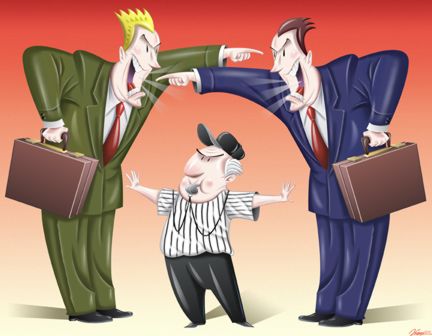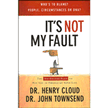The Blame Game Goes Into Overtime
Monday, September 21, 2009Shirking responsibility is as old as the first man, the first woman, and the first  Humble Pie no one wanted to eat. Adam blamed Eve, Eve blamed the Serpent, and the Serpent didn't have a leg to stand on (Genesis 3:9-19).
Humble Pie no one wanted to eat. Adam blamed Eve, Eve blamed the Serpent, and the Serpent didn't have a leg to stand on (Genesis 3:9-19).
Where did Bart Simpson learn his famous semi-self-incrimination, "I-didn't-do-it-nobody-saw-me-do-it-you-can't-prove-anything"? From his shift-the-blame father, Homer? Or maybe from watching the press conferences of accused politicians?
At work people repeat the adage, "Fix problems, not blame," even while they back-pedal and ask leading questions, like, "What did you know and when did you know it?" No one wants to 'fess up and admit, "It was my fault, and I'm gonna make it right." We all want to avoid the blame, which is really not the same as being truly blameless.
Yet there has been One among us who, though innocent Himself, was willing to take on our sins, to bear the burden of our mistakes, and to suffer the penalty for our crimes. We who accused really thought He was guilty, but it was our guilt that was laid on Him, our punishment He suffered.
God made Him, who knew no sin, to be made the sin offering for us, so that through Him we might become God's righteousness (2 Corinthians 5:21).
His willingness to bear our sins, however, does not take away the necessity for us to own up to our failures. His voluntary sacrifice prompts us to confess our sins, to renounce them, and to forsake them (see 1 John 1:7-10; 2:1-6). As long as we say, "I didn't do it," or "I'm not to blame," or "I'm not responsible for my actions," we cannot receive the forgiveness He has paid for. It is too precious for us to deny its necessity, too dear for us to squander.
Our pardon is available only when we are willing to plead guilty to our crimes, when we are ready to declare to anyone who will listen, "Yes, I did it. God saw me do it. He can prove everything."
--Steve Singleton
DeeperStudy.com
Want to go deeper?
The Greek adjective amemptos, -on ("blameless, faultless") and its related adverb apply to Christians, not because they are sinless, but because they are forgiven and walk after Jesus, having their sins cleansed by His blood (see Philippians 2:15; 1 Thessalonians 5:23; 1 John 1:7). The eighth-century BCE prophet Isaiah predicted Christ's role as sin-bearer (Isaiah 53:4-6, 8, 10-12), a role celebrated again and again in the New Testament (see John 1:29; Acts 8:30-35; Romans 3:25-26; Galatians 3:13; Ephesians 1:7; Hebrews 9:26-28; 1 Peter 2:24; 1 John 2:1-2).
Dr. Henry Cloud and Dr. John Townsend. It's Not My Fault: The No-Excuse Plan for Overoming Life's Obstacles to Enjoy God's Best (2006).
We've all said it, but who is to blame? Other people? Circumstances beyond our control? Genetics? Challenging you to stop hiding behind excuses, Drs. Cloud and Townsend offer eight principles to empower you to overcome self-defeating behavior, accept responsibility for your actions, and implement solutions instead of clinging to empty rationalizations. 272 pages, hardcover.
Recommended for online reading:
Eric Berne and Thomas Harris. "Blame Game".
Description of self-justifying behavior to cope with guilt feelings: blame someone else.
